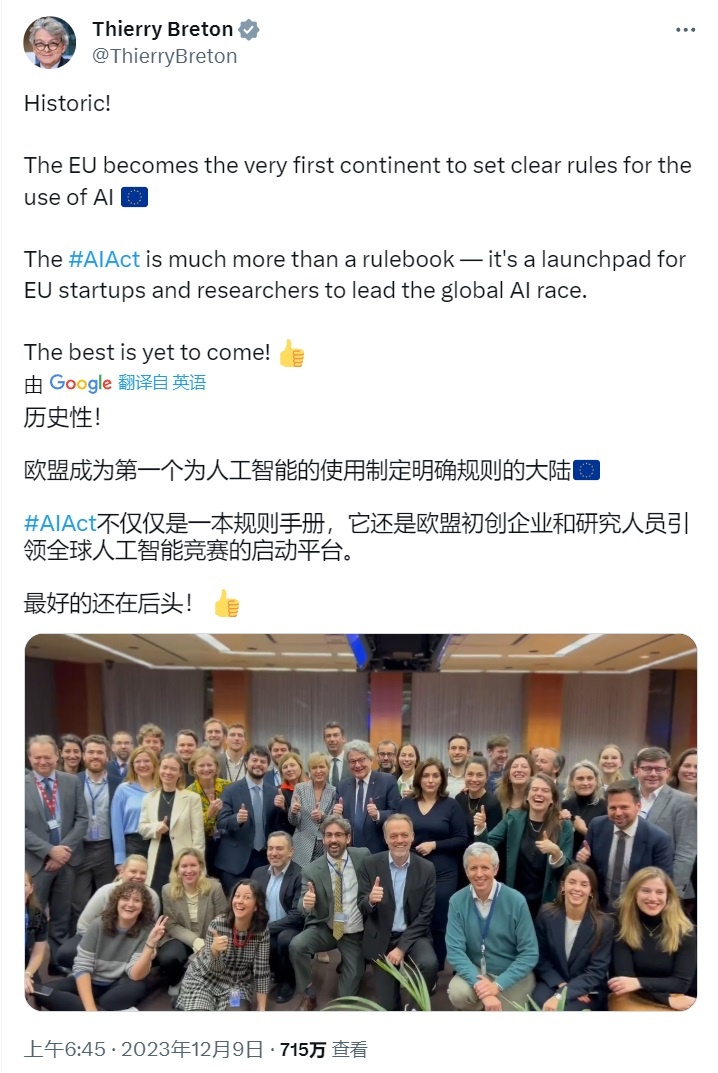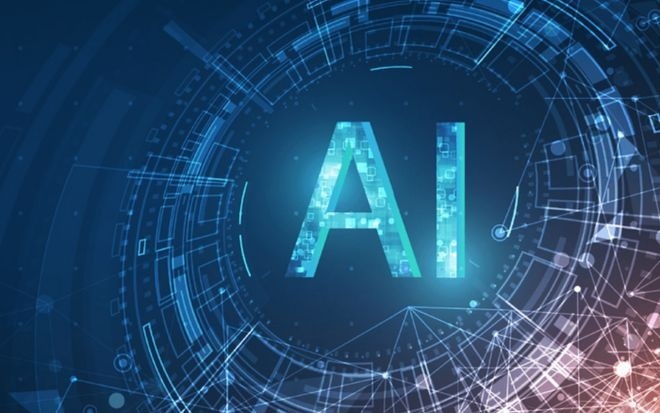The European Union reached the world's first artificial intelligence law proposal, which fired the "first shot" of AI regulation
On Friday, after nearly 36 hours of negotiations, EU negotiators reached a legal proposal on regulating AI rules.。
Last week, EU officials reached tentative agreement on the world's first comprehensive law regulating the use of artificial intelligence.。
First AI Act
On Friday, after nearly 36 hours of negotiations, EU negotiators reached a legal proposal on regulating AI rules.。The European Parliament will vote on the proposed AI law early next year.。If the bill is passed into effect, it will be formally applied in two years' time.。
EU Commissioner Thierry Breton confirmed in a post on X that an agreement had been reached。Breton described the plans as "historic" and said "the AI Act is more than just a rulebook, it serves as a springboard for EU startups and researchers to lead the global AI race."。"

Breton later told a press conference: "Europe has positioned itself as a pioneer, understanding the importance of its role as a global standard setter.。Yes, I believe, it's a historic day。"
European Commission President Ursula von der Leyen said the AI rules would provide a unique legal framework for developing trustworthy technologies.。
The proposals include safeguards on the use of artificial intelligence within the EU and restrictions on the adoption of artificial intelligence by law enforcement agencies.。Consumers have the right to file a complaint if they find a violation and ask the regulator to impose a fine for the violation。
One of the main subjects of this interim agreement is the enterprise that develops the model.。The agreement requires base models such as ChatGPT and General Artificial Intelligence Systems (GPAI) to comply with transparency and disclosure obligations before they are put on the market.。These include the drafting of technical documents, compliance with EU copyright law and the dissemination of detailed summaries of relevant training content。
In addition, high-impact AI models with systemic risks must conduct model assessments, assess and mitigate systemic risks, conduct adversarial tests, report serious incidents to the European Commission, ensure cybersecurity, and report on their energy efficiency.。GPAI with systemic risk may need to rely on codes of practice to comply with new regulations。
Another subject targeted by the interim agreement is the government.。Under the agreement, the government can only use real-time biometric surveillance in public places for victims of certain crimes, such as terrorist attacks, as well as searches for people suspected of committing the most serious crimes.。
The agreement also prohibits cognitive behavioral manipulation, the purposeless removal of facial images from the Internet or CCTV footage, social scoring and the use of biometric classification systems to infer politics, religion, philosophical beliefs, sexual orientation and ethnicity.。
In terms of penalties, fines for violations of the AI Act are determined as a percentage of the offending company's global annual turnover for the previous fiscal year or a predetermined amount, whichever is higher。For violations of prohibited AI applications, the fine is 35 million euros or 7% of global turnover; for violations of AI Act obligations, the fine is 15 million euros or 3% of global turnover; for providing incorrect information, the fine is 7.5 million euros or 1% of global turnover..5%。

Critical Voices
This artificial intelligence legal proposal reached by the European Union has also attracted a lot of criticism.。
A major criticism comes from the business community, where some business people believe that restricting AI development too soon or too severely will affect business innovation.。
In June, dozens of the largest European companies, including France's Airbus and Germany's Siemens, publicly said the rules were too strict to foster innovation and help local industries.。
After the proposal, Daniel Castro, vice president of the Information Technology and Innovation Foundation (ITIF), said: "Given the rapid development of artificial intelligence, EU lawmakers should suspend any legislation until they have a better understanding of what they are regulating."。The risk of unintended consequences from ill-considered legislation may be comparable or even greater than it is now。Unfortunately, fixing technology is often much easier than fixing bad laws。"
Castro feels EU should focus on winning innovation race, not regulatory race。"It's too early to know exactly what new rules might be needed.。Acting quickly may give the illusion of progress, but it's not。"
Cecilia Bonefeld-Dahl, director general of the business group DigitalEurope, said: "We reached an agreement, but at what cost??Bonefeld-Dahl believes the new requirements will require companies to invest significant resources to comply, and those resources will be spent on lawyers rather than hiring AI engineers.。
In addition to the business community, European Digital Rights, a human rights group focused on protecting citizens' privacy rights, has also been critical of the AI bill.。
Ella Jakubowska, of the group, said: "It is difficult to get excited about a law that, for the first time in the EU, has taken steps to legalise real-time public facial recognition across the EU.。Jakubowska said: "While Parliament has worked hard to limit the damage, the overall package of biometric monitoring and profiling has been lukewarm at best.。"
Despite many outside opinions, regulating AI has long been mainstream。Not only the European Union, the United States, China and many other countries with AI companies are studying legislation to regulate AI technology.。At the end of October, US President Biden signed a comprehensive executive order on AI, which is the first legal action taken by the United States against AI.。Although the executive order is not equal to the law, but the executive order also reflects the AI power - the United States on the attitude of AI technology。
The European Union took the lead in forming such an artificial intelligence draft, which fired the "first shot" of regulating AI.。Some professionals believe that this regulatory provision may subsequently become a reference for other government-prepared rules.。
·Original
Disclaimer: The views in this article are from the original Creator and do not represent the views or position of Hawk Insight. The content of the article is for reference, communication and learning only, and does not constitute investment advice. If it involves copyright issues, please contact us for deletion.